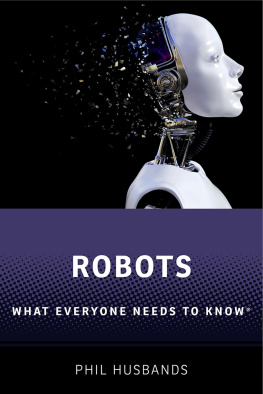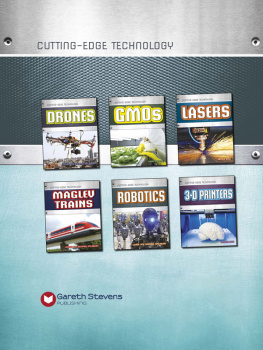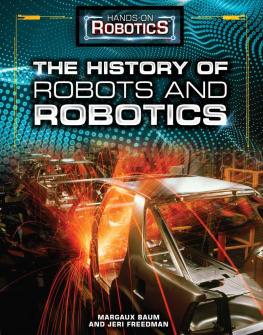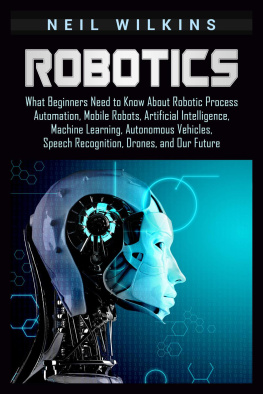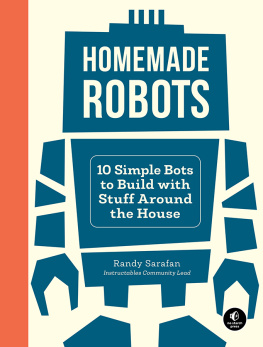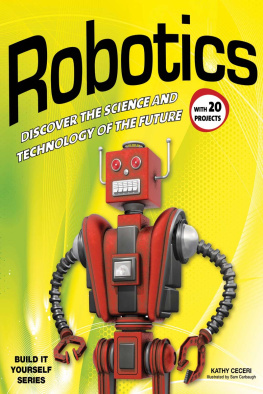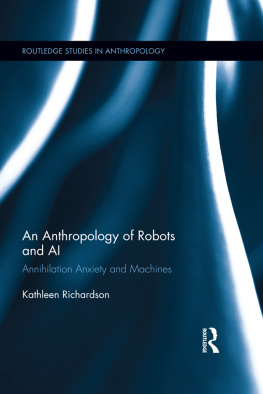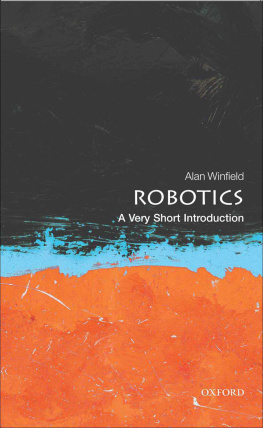ROBOTS
WHAT EVERYONE NEEDS TO KNOW

Oxford University Press is a department of the University of Oxford. It furthers the Universitys objective of excellence in research, scholarship, and education by publishing worldwide. Oxford is a registered trade mark of Oxford University Press in the UK and certain other countries.
What Everyone Needs to Know is a registered trademark of
Oxford University Press.
Published in the United States of America by Oxford University Press
198 Madison Avenue, New York, NY 10016, United States of America.
Phil Husbands 2021
All rights reserved. No part of this publication may be reproduced, stored in a retrieval system, or transmitted, in any form or by any means, without the prior permission in writing of Oxford University Press, or as expressly permitted by law, by license, or under terms agreed with the appropriate reproduction rights organization. Inquiries concerning reproduction outside the scope of the above should be sent to the Rights Department, Oxford University Press, at the address above.
You must not circulate this work in any other form and you must impose this same condition on any acquirer.
Library of Congress Cataloging-in-Publication Data
Names: Husbands, Phil, author.
Title: Robots : what everyone needs to know / Phil Husbands.
Description: New York : Oxford University Press, 2022. |
Series: What everyone needs to know |
Includes bibliographical references and index.
Identifiers: LCCN 2021013379 | ISBN 9780198845393 (paperback) |
ISBN 9780198845386 (hardback) | ISBN 9780192584083 |
ISBN 9780192584090 (epub) | ISBN 9780191925948
Subjects: LCSH: RoboticsPopular works. | RobotsMoral and ethical
aspectsPopular works. | RobotsForecasting.
Classification: LCC TJ211.15.H87 2022 | DDC 629.8/92dc23
LC record available at https://lccn.loc.gov/2021013379
DOI: 10.1093/actrade/9780198845386.001.0001
To CJH
Contents
For some years now there has been a steady stream of far-fetched articles in the media about the impending arrival of super-intelligent robots, along with stories about how most jobs will soon be lost to robots. Many of these myths are whipped up by pronouncements from celebrity technologists (and sometimes scientists) who have little direct knowledge or understanding of AI and robotics research. So it is important to provide a sober, balanced, and informed account of the current state of robotics, where it has come from, and where it might go in the future. The main aim of this book is to explain what robots actually do now and what they might be able to do in the future.
Since the turn of the millennium a quiet revolution has been underway. Millions of autonomous robots with some level of intelligence are now in domestic use, mainly as vacuum cleaners. Driverless carswhich are nothing less than autonomous robotsare starting to appear on our streets, as are delivery and security bots. There is a huge effort underway in industry and universities to develop the next generation of more intelligent, autonomous, mobile robots. Unsurprisingly, these machines, which often seem to display life-like properties, are attracting great attention. Now is the time to learn more about them. How do they work? Do they pose a threat or an unprecedented opportunity?
Even though current robots are nowhere near as intelligent as some would have us believe, and nearly all serious AI and robotics researchers believe the path to major advances is long and difficult, there are still significant ethical issues that arise from todays technology and even bigger ones that will emerge from likely developments in the coming years. There seems to be an irresistible momentum that is bringing us closer to the moment when robots are mobile, widespread and commonly share our environments. But that moment is pregnant with risk. Even barely intelligent machines, or devices that are less intelligent than their makers claim, can cause serious societal issues. Politicians are beginning to wake up to the fact that it is important to understand and plan for these eventualities now. Naturally these issues are of great interest to all of us. So, some of the main problems of robot ethics will be discussed in this book, along with the wider socio-political challenges that robot technology might bring. I question to what extent these concerns are different from those that have arisen in the past from other forms of technology.
Robotics has, and always has had, a complex two-way relationship with popular culture. I try to reflect this throughout the book, and dedicate a chapter to a more detailed discussion of the topic.
But its not all driverless cars and vacuum cleaners. There are many other interesting, useful, and imaginative robot applications appearing all the time. I try to give a flavor of some of these to give an impression of the ever-growing variety. How these developments come to impact our lives should be largely up to us. That will only happen if we walk into our robot futures with our eyes wide open, so that we are not hoodwinked by duplicitous corporations or shady politicians.
Thanks to Bart Baddeley, Ken Barrett, Maggie Boden, Josh Bongard, Rodney Brooks, Paul Brown, Andy Clark, Tom Collett, Ezequiel DiPaolo, Alice Eldridge, Dario Floreano, Inman Harvey, Owen Holland, Nick Jakobi, Stefano Nolfi, Michael OShea, Rolf Pfeifer, Andy Philippides, Jordan Pollack, Torsten Reil, Anil Seth, Yoonsik Shim, Mike Wheeler, the late John Holland, and the late Jack Good, among many others, for helpful discussion over the years on topics related to those covered in this book.
Thanks to Lewis, Ella, and Theo for sci-fi conversations, to Lewis for help with figures, and to Alison for help with illustrations, proofreading, and much else.
Thanks to Natasha Walter for access to material relating to Grey Walter.
Many thanks to the team at OUP. To Latha Menon for suggesting, encouraging, and organizing this project, as well as for insightful editorial comments, and to Jenny Nuge for all her help. Thanks to the anonymous reader for very useful comments on an earlier draft of the book. Also many thanks to Felshiya Samuel and the team at Newgen for seamlessly managing the production stages.
The most common idea of a robot has changed little in nearly a century: some kind of mechanical man or womanhumanoid machines capable of performing many of the tasks we engage in all the time, such as walking, talking, picking things up and moving them around, as well as some of those that most of us try to avoid, such as indiscriminate acts of death and destruction. Later we will see that this imageand indeed the very idea of a robotcomes from the world of fiction. While it is true that these myths and dreams have seeped into the collective conscious and undoubtedly influence some of the scientific work in the field of robotics, the current realitythough full of enormous interest and potentialis a little less dramatic. As these more mundane machines become commonplace we will start to think of robots in a very different way.
Robots have been used in some industries for more than half a century, so why should we suddenly care? Twentieth-century industrial robotsthe kind found on car production linesmainly operated out of the public gaze and, although sophisticated, were essentially dumb, so they never roused much debate. But since the turn of the millennium new robotic breeds have started to appear at an accelerating pace. Robots that show glimmers of life-like intelligence have started to appear in our homes (autonomous vacuum cleaners) and on our streets (driverless cars), and are being developed for all kinds of applicationssome benign, some troubling. It is these mobile, intelligent robotson the cusp of becoming integrated into our everyday livesthat are now sparking great interest. What can they actually do now and what might they be able to do in the future? Will they force us to change the ways we think about technology and the uses of technology? Will they fundamentally change the ways we live and work?

